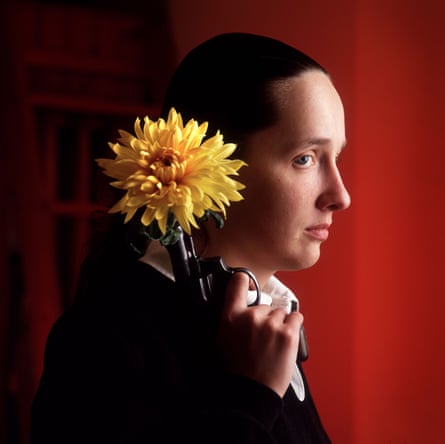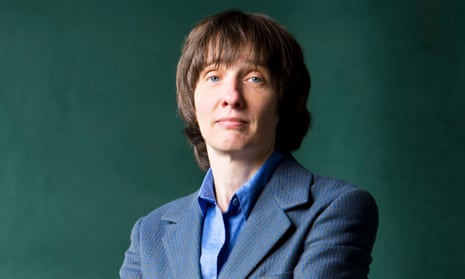AL Kennedy is moving again. Back in 2012, sick of spending half her life schlepping up and down the country on a train, she succumbed to the capital’s gravitational pull and made the journey south from Glasgow to London. With no fixed idea about where she wanted to end up, she drew a ring around the city’s “hysterically expensive” centre and began to explore the areas at its edges. Eventually, she discovered Lewisham’s Telegraph Hill: an unshowy, bedded-in neighbourhood of solidly handsome houses, set foursquare around a small, steep park stocked with trees that are mature and beautiful. “It’s lovely,” Kennedy says. “It’s the best place to live in London.” We meet in a pub at the bottom of the Hill. “Beautiful streets, nice folk, proper community,” she says, between cautious sips of tea. “People smile at each other and have conversations.” But even so, she is packing up; leaving for the picturesque estuary town of Wivenhoe, in Essex. The city has proved too much for her. “The pollution is kind of killing me,” she admits, with a sigh that segues into a raw cough. “I’m on triple-dose antihistamines just so I can breathe. It didn’t used to be this extreme: before I moved I’d stay here for weeks at a time and be able to see and everything. It’s got really bad since I arrived, basically. I’m trying not to take it personally.”
Frankly, it is a low blow for the capital to have dealt, given that she has spent her four years here writing a novel about it. Her characters, though, would most probably view it as all of a piece with a city in which the pollution has come to feel like the visceral emanation of a place gone sour; a place where money rules, competition is a religion, and poverty or disability of any kind rule you out of the game. Serious Sweet is the story of Jon, a career civil servant whose disenchantment with the government’s ruthless social policies is slowly corroding him, and Meg, a recovering alcoholic living in (of course) Telegraph Hill, who come into contact with each other when Jon sets up a letter-writing service in a bid to ease his loneliness, to which Meg, in her loneliness, subscribes. The novel is at heart a love story, but one that is as warped and wretched as it is tender. The parallel Kennedy draws between her broken, brutalised characters and the city they are fighting to survive in is a vivid one, and not at all complimentary – but nor is it entirely without hope.
While on the one hand, Kennedy says, London these days is “not so much a city as an investment opportunity: depressing for so many reasons”; on the other, there is still a humanity to the city that no amount of property development and social erosion can obliterate. Throughout the novel, the central story is punctuated with standalone snapshots of a less corporate, more benevolent city; pearlescent vignettes that capture transient moments of kindness and connection. A busker kneels to play “Twinkle, Twinkle, Little Star” on his saxophone to a small boy. A woman falls down an escalator at London Bridge station, and passersby come running. A pair of recent fathers bond over pushchairs. “All the incidents are real,” Kennedy explains. “I collected them for a year; I had more than I could use. London’s such a huge place, and people are under such pressure, they are exhausted and ground down, but it’s also fundamentally tolerant. The papers spend their time telling you how terrible folk are, but the fact is people here are astonishingly gentle and lovely with each other. My project indirectly was to look for that side of things. It’s there.”
When Kennedy first came to London, back in the late 70s, it was for one reason only: the theatre. Born Alison Louise Kennedy in Dundee in 1965, she was an early, greedy reader, but it was the stage that won her. “I remember the first thing I ever saw,” she says. “This strange, experimental play. A guy dressed in white was being stabbed, and curls of red crepe paper unravelled over him so eventually he was covered with them. Very impressive if you’re six.” From that point she was helplessly hooked. “I’d use the word obsessed, yes. Addicted. I saw everything that was touring in Dundee, and then I started getting the bus down to London. A return ticket cost about £13, which meant I could afford to go to the West End, Stratford East, the Old Vic … I’d get the overnight coach on Friday, see a matinee, an evening performance, dash for the late bus, sleep all day Sunday and go to school on Monday.”

If that sounds like dedication, bear in mind that Kennedy was 12 when she started going – and she travelled alone. “Who else would go with me?” she says, in response to my dropped jaw. “I don’t think anybody was worried: I was clearly a monomaniac; watching plays was all I’d be doing. Later, I formed a theatre club at school so I could see the things I wanted in Scotland – and I went on a school trip to see the RSC, which blew me away. After that, my mum gave me her child benefit to save, and I’d get a B&B in Stratford for a week in the summer and see as much of their programme as I could. It wasn’t as starry back then; if you went to the stage door, there’d only be three of you and you’d all be theatre fanatics, so I met Derek Jacobi, Michael Gambon and the rest of them. All I really wanted was to say them: ‘Thank you very much for slightly changing my life.’”
More than slightly, as it turned out: Kennedy’s precocious love affair shaped everything that came after. She went to Warwick University to do theatre studies, and adored it, but discovered that there was something she adored more. “I loved sitting in the front row; the fine haze of saliva; the possibility of being made to feel something ecstatic. And I loved performing, too. But I was always writing. I’d write audition pieces for friends, where you’re trying to do bells and whistles so they can look good. And it turns out there’s only a fag paper between that and a short story … ”
The metamorphosis to author did not, however, occur overnight; her first book, a bleakly, blackly brilliant collection of Scottish-set short stories, captivatingly titled Night Geometry and the Garscadden Trains, wasn’t published until 1990, half a decade later. At that point things took off fast: the book won a clutch of awards, and three years later, following the publication of her first novel, Looking for the Possible Dance, she made Granta’s Best Young British Novelists list. Back in 1985, though, she had graduated and was floundering. Having inconveniently worked out “that I wasn’t going to be an actor because a) I don’t look the way women have to to do well, and b) it’s horrible”, she drifted back to Dundee and embarked on her inaugural career – as a children’s puppeteer. “It was quite a strange setup,” she says. What are we talking, here? Punch and Judy? Sooty? “It was a theatre-in-education job, but you could do anything, really – like writing for BBC Education, which was how I started scriptwriting, down the line. We put on plays in schools, and we’d do summer fairs, where everyone was pissed and the children were feral. You’d be in your booth, and the kids would start rocking it, at which point you’d go out in your clown costume and stamp your big feet to get their fingers back.”
It was, she admits, a “fucking awful job”, and she started almost immediately looking for another one. “The first thing that came up was in Glasgow, and I loved Glasgow – that was where the bus stopped on the trip to London, and at 3 o’clock in the morning it smelt of the sea. I was a community arts worker, doing 70-hour weeks: writing workshops; circus workshops; concerts; murals, for a youth theatre … Then I did roughly the same thing at an arts and disability charity, working with people with visual impairment, learning difficulties, degenerative diseases, traumatic injuries, MS, strokes. Housebound people, people getting better, people dying. People who were just disabled by poverty, who needed somewhere to have some time off … ” What does that do to your view of the world? “It made me realise that our view of the world was wrong; that the people you were hearing from on the telly were a tiny, tiny minority, and they hadn’t got a fucking clue how anybody else lived. You don’t really come back from that.”
Her fiction bears this out. It is there in her focus on the rich interior lives of characters who are sick, tired, grief-stricken, impoverished – ordinary people, in other words. Fury at the brutality of Conservative welfare cuts, meanwhile, is an explicit driving force in Serious Sweet. “It’s really an extension of Day,” Kennedy says, referring to her celebrated 2007 novel of a returned second world war fighter pilot, which won her the Costa book of the year award. “I read newspapers from the late 1940s, and the whole public discourse was completely different. It struck me that the achievements of that generation, which were truly remarkable, were being – or had been – destroyed. So I wanted to write about that; about the second half of that story. I used to go abroad and see people begging and think, how could things go this wrong? And now I’m seeing people not just begging in the street here, but sleeping in the street, crying in the street. And we know what the answer is because we were doing it. After the war we had nothing, there was a massive refugee crisis. But we knew what to do – because all of the shit had been boiled away, and we’d been tested.”
As for the future, she plans to write about the state of things more directly via a series of essays, which may at some point come together to form a follow-up to her brilliant 2013 collection, On Writing. “Then there are three or four stories, which means another collection. And I’m thinking of a new novel; after I’ve done the essays and stories, I’ll get to that.” First, though, there’s Wivenhoe. Why there? “Serendipity,” she says. “The people at the bookshop messaged me saying, ‘We bet you wouldn’t do a reading in Wivenhoe’. I looked online and it seemed quite nice, so I said, ‘I bet I would.’ And they were really lovely. It’s a nice little corner. I think being out of London is the new being in London. At least I’ll be able to breathe.”

Comments (…)
Sign in or create your Guardian account to join the discussion